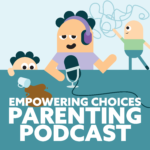Ep.86 – 5 Common Mistakes Dad’s Make with their teen Daughters Pt. 4: Expecting Blind Obedience

In episode 86 of the Empowering Choices Podcast, titled “5 Common Mistakes Dads Make with Their Teen Daughters Pt. 4: Expecting Blind Obedience,” hosts Joshua, Lucas, and Erik, who are licensed professional counselors, delve into the complexities of father-daughter relationships during adolescence. The episode focuses on the detrimental effects of demanding blind obedience from teenage daughters, a parenting approach that often stifles personal growth and critical thinking. Erik discusses the consequences of a dictatorial parenting style, noting that it can severely impact a young woman’s ability to form her own opinions. “I’m a person that asks questions, and hearing the answers actually really helps me be able to form my own thinking,” Erik quotes a young woman from his counseling practice. This statement encapsulates the episode’s theme—that fostering an environment where daughters can question and learn is crucial for their development. The hosts argue that as children grow, particularly from grade school to high school, their cognitive and emotional development should be accompanied by an increasingly open dialogue with their parents. Erik emphasizes, “They’re going to go from middle school years into high school years, and all along the way, there are developmental changes.” He suggests that parents should transition from asserting their beliefs to discussing and explaining these beliefs as their children mature. Lucas brings an alarming perspective by linking blind obedience to potential dangers outside the familial context, particularly in exploitative situations. He shares an anecdote from the pornography industry to illustrate how blind obedience can lead young women into manipulative and harmful situations. “If your daughter grows up to blindly obey, she may not end up finding someone who it is good to follow,” Lucas warns, highlighting the risks of not teaching daughters to critically evaluate the intentions of others. Moreover, Erik points out that daughters often look for traits in their partners that resemble their fathers’ behaviors. “Girls will look for their fathers’ pattern in the men that they will have close intimate relationships with for the rest of their life,” Erik explains, stressing the importance of fathers being good role models. This insight serves as a call to fathers to embody the qualities they hope to see in their daughters’ future partners. In conclusion, the podcast episode advocates for a parenting approach that encourages questioning and understanding rather than compliance without thought. By engaging in meaningful conversations and being role models, fathers can equip their daughters with the tools to navigate the complexities of relationships and society effectively. As the episode wraps up, the hosts remind listeners that fostering critical thinking in daughters does not just prepare them for debates at home but for the challenges they will face in the wider world.

Responses